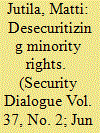|
|
|
Sort Order |
|
|
|
Items / Page
|
|
|
|
|
|
|
| Srl | Item |
| 1 |
ID:
072544


|
|
|
|
|
| Publication |
2006.
|
| Summary/Abstract |
The article discusses Paul Roe's argument that minority rights are always problems of (societal) security. According to Roe, a Huysmanstype deconstructivist strategy, which can be used in desecuritization of migration, is not possible in minority situations, because maintenance of a collective identity is central for minorities; therefore, the desecuritization of minority rights may be 'logically impossible' in certain cases. The present article focuses on Roe's arguments and attempts to find ways to avoid his determinism. It introduces a reconstructivist strategy for the desecuritization of minority rights, based on the process and discursive aspects of identity. It is possible for the stories of ethnically defined collective identities to be told in such a way that they do not exclude other such identities from the territory of a state. With this strategy, the author tries to show that desecuritization of minority rights is always logically possible, though in some cases it might be practically impossible in the foreseeable future.
|
|
|
|
|
|
|
|
|
|
|
|
|
|
|
|
| 2 |
ID:
072547


|
|
|
|
|
| Publication |
2006.
|
| Summary/Abstract |
The growth of cooperative relations between Syria and Turkey, after the two countries came to the brink of war in 1998, has been a major development in the Middle East. This article examines both the reasons behind increasing ties between the two countries and the new challenges this rapprochement is facing due to the rapidly shifting international context. It argues that although systemic factors have been crucial in setting up the parameters of the bilateral relationship, these factors gain meaning through the complexities of domestic settings. The US policy of regime change and the Iraq War of 2003 and its aftermath are taken as the main regional and international factors influencing relations between the two countries since 1998. Domestic factors like the process of regime consolidation in Syria under Bashar and rising nationalism, the Kurdish issue, and the coming to power of the Justice and Development Party in Turkey constitute the main lenses through which these systemic factors are evaluated and policy outcomes projected.
|
|
|
|
|
|
|
|
|
|
|
|
|
|
|
|
| 3 |
ID:
072546


|
|
|
|
|
| Publication |
2006.
|
| Summary/Abstract |
In the debate on human security, the leading question for many is 'where do we go from here?' Through this article, the authors contribute to the discussion by exploring both the extent to which gender approaches have been relevant to the human security debate thus far and how they can offer some directions forward. They argue that gender approaches deliver more credence and substance to a wider security concept, but also enable a theoretical conceptualization more reflective of security concerns that emanate from the 'bottom up'. The authors therefore incorporate gender theory to develop human security as an epistemological perspective to security studies. Gender theory claims that security must be linked to empowerment of the individual, as well as to the capabilities to create positive environments of security. They employ the tool of resistance as one crucial example of human agency in security. Practices of resistance, in the latter's various empirical forms, are present in all social contexts. Such a perspective on security directs attention to the practices of agents and provides a basis for exploring contextually dependent insecurities and securities.
|
|
|
|
|
|
|
|
|
|
|
|
|
|
|
|
| 4 |
ID:
072543


|
|
|
|
|
| Publication |
2006.
|
| Summary/Abstract |
This article examines how Canada's new national security policy operates through language and practices that take elusive risks to the health and safety of the population as an opportunity for action, and is made possible through an expansion of surveillance. The biopolitical character of security has greatly reduced the traditional distinction between the state as a military apparatus and the state as a service provider and manager of the citizenry. The article argues that the biopolitical governance strategies of Canada's national security policy treat the problems for political freedom, equality and democratic accountability posed by encroaching security measures as largely negligible in the face of indeterminable danger. Using a Foucauldian analysis, the article establishes the connection between biopolitics and security. It subsequently examines how the Canadian policy deploys truth claims about the immanence of 'threat' and how claims about Canadian values produce an internal 'other' that represents the proliferation of threats. The article then focuses on two principle techniques of governance: first, guarding the freedom, health and safety of the population, and, second, expanding surveillance to give national security a totalizing reach. The article concludes by theorizing the implications of security governance for legitimating racial profiling and the 'war on terror'.
|
|
|
|
|
|
|
|
|
|
|
|
|
|
|
|
| 5 |
ID:
072545


|
|
|
|
|
| Publication |
2006.
|
| Summary/Abstract |
One way of exploring the paradox of (in)security and its implications for the reproduction of violence is to inquire into how the promise of a secure subject is inscribed in discourses of (in)security. Why is the successful securing of 'we' impossible? How might the supplementary relationship between security and insecurity inform the inscription of 'we' as the sovereign subject of security? Arguably, integral to the promise of an assured security is the concealment of the impossibility of fulfilling this very promise. This article aims to closely examine how a specific 'we', as the 'subject' of security, is constructed. Reading from the (in)security narratives of Mayan women - narratives that reflect the lived experiences of marginalized peoples struggling for security in resistance - it explores how the inscription of a specific and multiple identity, 'Mayan women', as the subject of security enacts and resists many of the dangers of securitizing identity that seem to be attendant to modern logics or grammars of security. Looking at how the impossible promise (or the ultimate failure) of securing identity plays out in a particular site among people whose voices are not often heard in writings on security invites reflection over failure as an opening for rethinking (in)securing identity.
|
|
|
|
|
|
|
|
|
|
|
|
|
|
|
|
|
|
|
|
|